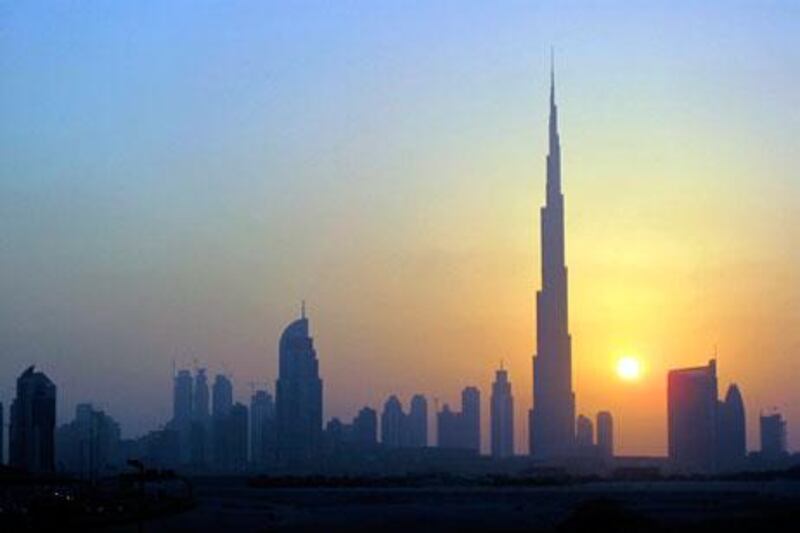Multibillion-dollar debt restructurings, loan defaults and woe for the country's lenders dominated an eventful year for the UAE's financial and banking sectors.
But there were at least a few hints of a nascent recovery. The completion of Dubai World's US$24.9 billion (Dh91.45bn) restructuring in September gave a much-needed boost to stagnant local markets, and numerous companies and governments successfully sold bonds to international investors to help refinance their borrowings.
Dubai World
Dubai World's debt restructuring was the UAE's biggest financial story this year. At the beginning of 2010, the government-owned conglomerate was still in the initial phases of talks with creditors about extending debt maturities after the company's announcement the previous November that it would ask for a stay on repayments while negotiations progressed.
The Dubai World story was big because of the size of the liabilities facing the company - it wanted to restructure almost $25bn of debt - and because of its important role in the emirate's economy. Until Dubai World began to restructure, the hope was that the UAE would dodge most of the crushing effects of the global financial crisis.
Property prices had dipped by half in some parts of Dubai since the peak in 2008, but few people expected the slump to hit such a large company quite so hard. Among Dubai World's subsidiaries are Nakheel, the property developer behind the emirate's palm-shaped islands, and DP World, the global ports operator.
After months of discussions between Dubai World and banks that lent it money during an unprecedented boom in global credit markets, the sides reached a final agreement in September.
The $24.9bn deal, which called for existing debt to be extended into new five and eight-year loans, was immediately hailed as evidence that Dubai and its government-owned companies were making progress in addressing a debt load estimated by the IMF in February to be $109bn.
The restructuring has yet to be signed, however, because executives and bankers are still working out its legal structure. And troubles persist at Nakheel, which is in the process of separating from Dubai World. Meanwhile, Sultan bin Sulayem stepped down as the chairman of Dubai World this month in a reshuffling of the board of directors.
Observers say that while Dubai World's restructuring pact was a positive development, more debt restructurings are likely next year. Dubai and its government-linked companies have more than $31.7bn of debt coming due next year, according to a recent Bank of America Merrill Lynch report.
"There's no question there's going to be more restructuring," says Ahmad Alanani, the director of fixed-income sales at Exotix in Dubai. "It needs to happen."
Dubai Holding
Several divisions of the conglomerate entered talks to extend debt repayments this year.
Dubai Holding Commercial Operations Group, an arm that owns the Burj Al Arab hotel and TECOM, a free-zone operator, got a two-month extension on $555 million of debt in July. It received another extension in September and later got a third reprieve until the end of this year.
Dubai International Capital, Dubai Holding's private-equity arm, also got an extension on repayment of a $1.25bn loan over the summer but managed to work out a $2.6bn restructuring this month. And Dubai Group, the financial division of Dubai Holding, entered talks with lenders last month.
Dubai Holding's debts are not as big as Dubai World's, but analysts and economists see the refinancing talks as a litmus test for the success of the next stage of restructurings. As with Dubai World, asset sales are expected to help Dubai Holding reduce its debt.
"Asset sales are going to be on the cards," says Turker Hamzaoglu, an economist at Bank of America Merrill Lynch.
Bank provisioning
Restructurings at Dubai World and Dubai Holding, and defaults by the Saad and Al Gosaibi groups of Saudi Arabia, hit the banks that lent them money before the financial crisis hard.
As those loans went sour, lenders in the UAE had set aside Dh39.6bn as of the end of October, according to Central Bank data. That was up from just Dh32.6bn of provisions at the end of last year.
With more debt restructurings on the way, few analysts expect provisions to cease to be a problem next year. And that could contribute to relatively modest profits for banks that are already deleveraging and dealing with overexposure to depressed property markets.
"It's going to be another difficult year, but hopefully not as difficult as 2010," says Murad Ansari, a banking analyst at EFG-Hermes. "It's going to be a slow start to the year, and I think provisioning pressures will continue."
Bond markets improving
Dubai World's debt pact set the stage for Dubai to issue $1.25bn of bonds in late September. Several companies, including Emaar Properties and the Dubai Electricity and Water Authority, followed with their own bond issuances.
Coupled with the gradual resolution of Dubai's debt issues, better investor appetite for emerging-market debt is expected to play a key role in helping the emirate refinance debt in the new year.
That appetite, however, may not be enough in itself to relieve Dubai of its debt burden, Mr Hamzaoglu says.
"It's very significant that Dubai has issued bonds that have very nice yields, but, also, we're telling investors not to be carried away with that," he says. "The investment pipeline is so crowded that the yields might justify some spread over the other quality names in the region."





